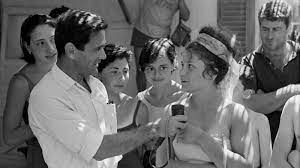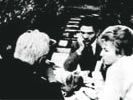Eye For Film >> Movies >> Love Meetings (1964) Film Review
Love Meetings
Reviewed by: Themroc

Love Meetings, Pasloini’s absorbing 1964 nationwide survey of Italian attitudes to sexual behaviour and mores, opens with the director asking young children where they think babies come from. As the film progresses, the answers he gets from the adults on subjects such as prostitution, marriage, homosexuality, sexual equality and divorce (which was illegal in Italy at the time) are seldom better-informed than those of their baffled offspring. However, it is a mistake to simply sum the film up as simply a dated portrayal of quaint early Sixties ignorance.
My poor knowledge of Italian geography meant that distinctions in regional attitudes were largely lost on me (although rural attitudes appeared less flexible than those of city-dwellers). Across the board, however, there seems to be agreement that the young enjoy far greater freedom than the elderly did “in their day”, but predictably there is disagreement over whether or not such a development was, on balance, desirable.

Female interviewees, by and large (though not exclusively or unanimously) agree that women ought to be allowed the same de facto behavioural rights as men, while male interviewees seem less keen on the idea. There is disagreement between realists and traditionalists on the subject of divorce - with the latter outweighing the former by about two to one. On the subject of homosexuality, attitudes are united in a mixture of fear and revulsion, which is hardly surprising given how seldom the subject was even acknowledged, let alone openly discussed.
Even Pasolini, who was never able to fully come to terms with his own sexuality, infers that homosexuality ought to be better understood as a physiological affliction that could be “cured”. Equally unsurprising, is the consensus amongst interviewees, both male and female, that the passage of the Merlin Act, which outlawed brothels and therefore the regulation of organised prostitution, had been a terrible mistake for the women and their clients alike. However, although at first this seems to reflect an unexpected streak of progressive thinking, it is in fact symptomatic of the general conservatism and resistance to change of any sort that characterises most of the answers. Although lip service is paid to perfectly sensible arguments for re-legalising prostitution, I suspect that if Pasolini had asked the same question of the same people after 40 years of prohibition, they would all have endorsed the status quo.
The central problem with the documentary is that whilst the working class interviewees are happy to express their views frankly, Pasolini finds it nearly impossible to penetrate the bourgeois veneer of respectability to get the middle classes to talk about the subject. As one responds when asked a characteristically blunt question by her impatient inquisitor: “You have to understand that in order to get answers to these questions, you would need to talk to your interviewees for a long time and waste a lot of film”.
When asked to explain why this is, a psychologist speculates that their reticence comes from both a fear of the self-awareness necessary to answer the questions honestly and a reluctance to risk negative social repercussions by saying something controversial or non-conformist. The result, as Pasolini himself acknowledges, is that there is a large black hole in the centre of his film. It ends up being, not a representation of Italian attitudes, but a representation only of the attitudes of those prepared to answer his questions. Although it is possible to guess at why others refuse to discuss such subjects, it’s impossible to know what they really think about them.
Confronted with this awkward fact, Pasolini attempts to spuriously link his findings to a Marxist critique of Capitalism by summarising: “People talk [about these subjects] with disarming superficiality or hopeless confusion… all this in a country blessed by an economic miracle… naively hoping to find signs of a simultaneous cultural and spiritual miracle. The spirit of a materially wealthy Italy is refuted by real Italians.”
In fact, what the film presents is far more prosaic. It’s simply a portrait of a sexist, homophobic, socially conservative, morally reactionary underclass with no interest in solidarity, equality or in understanding those perceived as different or “abnormal”. Contrary to being a phenomenon unique to the unenlightened Italy of the early 1960s, what makes the film pertinent today is that these are exactly the same people who flocked to the polls to vote in the Eighties, Nineties and Noughties for Margaret Thatcher, George W. Bush and Silvio Berlusconi.
Reviewed on: 21 Mar 2007

















